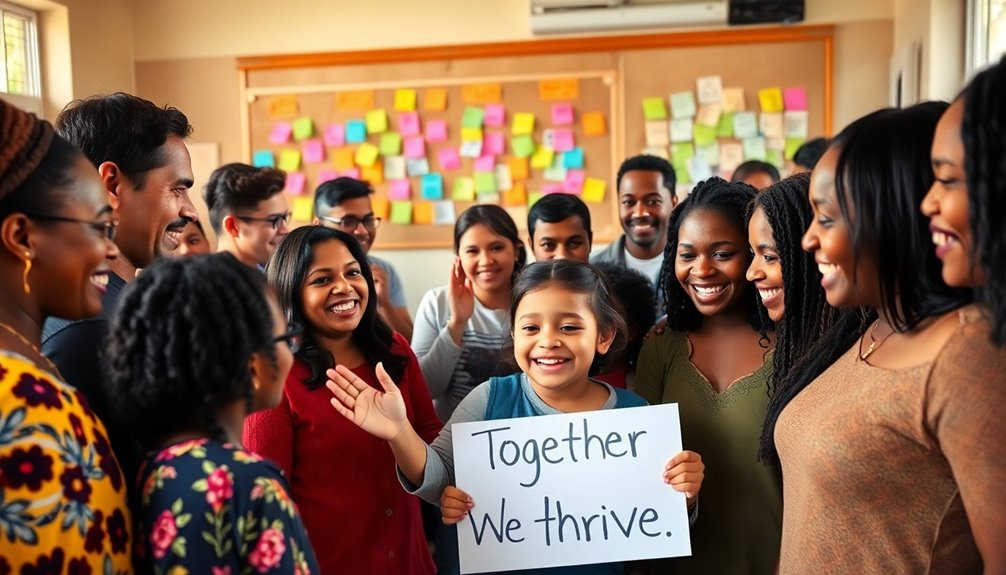Staying positive in emergencies is crucial for your survival and well-being. A positive mindset boosts your problem-solving abilities, reduces anxiety, and enhances decision-making under pressure. When you view challenges as temporary setbacks, you cultivate resilience that helps you adapt to stress. By setting achievable goals and nurturing hope, you can turn adversity into opportunities for growth. Engaging with your community also provides essential support, making you feel less isolated. Practicing daily self-care and mindfulness reinforces your emotional strength. To discover practical tips and techniques for maintaining positivity, you might want to keep exploring further.
Key Takeaways
- A positive mindset enhances decision-making and problem-solving abilities during emergencies, leading to more effective responses to challenges.
- Practicing daily self-care activities fosters emotional well-being, helping individuals maintain hope and resilience in stressful situations.
- Setting specific, achievable goals allows individuals to focus on actionable tasks, transforming adversity into opportunities for growth and recovery.
- Community support is crucial; sharing knowledge and resources reduces isolation and empowers individuals to navigate crises collaboratively.
- Maintaining a hopeful outlook can significantly improve physical health, reducing stress and promoting healthier lifestyle choices that aid survival.
Importance of a Positive Mindset

In emergencies, a positive mindset acts like a beacon, guiding you through chaos and uncertainty. When faced with pressure, your ability to make rational decisions improves considerably. A positive outlook allows you to tackle complex problems by breaking them down into manageable steps, which fosters effective problem-solving. You’ll notice that optimism boosts your confidence, enhancing your belief in overcoming challenges. Additionally, embracing a positive mindset can lead to greater resilience, which is crucial in navigating difficult situations. Furthermore, incorporating mental preparedness techniques for survival can complement your positive mindset, equipping you with tools to remain focused and calm during crises. These techniques not only strengthen your psychological resilience but also elevate your ability to respond effectively to unexpected challenges. As you cultivate this proactive approach, you’ll find that your readiness to face adversity exponentially increases, transforming potential setbacks into opportunities for growth.
Moreover, a positive perspective reduces anxiety, enabling clearer thinking and sharper decision-making. This adaptability makes it easier for you to adjust to new situations and discover innovative solutions. Maintaining high morale is also essential; your positive mindset not only elevates your performance but encourages teamwork and cooperation, vital for survival. Mental resilience enables you to bounce back from setbacks and remain focused on your goals.
Recognizing individual efforts and celebrating small victories will keep you motivated during prolonged crises. Establishing routines gives you a sense of purpose and control, helping maintain morale. Ultimately, prioritizing a positive mindset enhances your physical and mental health, reducing the risks of stress and heart disease. Embracing positivity equips you to navigate emergencies more effectively, ensuring that you remain resilient in the face of adversity.
Understanding Psychological Resilience

Psychological resilience is all about your ability to bounce back from crises and adapt positively to challenges. Understanding the factors that influence your resilience, like personal traits and social support, is key to strengthening it. By exploring effective strategies, you can build your resilience and enhance your overall well-being during tough times. Positive emotions play a significant role in enhancing flexibility in thinking and problem-solving during adversity, further aiding your recovery from stressful experiences. Additionally, engaging in mindfulness practices can help improve self-awareness and emotional regulation, which are crucial during challenging situations.
Defining Psychological Resilience
Resilience is an essential trait that allows individuals to thrive during crises and bounce back from adversity. Psychological resilience specifically refers to your ability to cope mentally and emotionally with crises, enabling you to return to your pre-crisis state quickly. It involves harnessing mental processes and behaviors that promote personal strengths while shielding you from the negative effects of stressors.
Resilience is an adaptation of psychological traits and experiences that helps maintain your mental health during challenging times. Unlike psychological recovery, which focuses on returning to your mental state before a traumatic experience, resilience emphasizes positive adaptation after facing adversity. Research indicates that resilient individuals often view setbacks as temporary and see change as an opportunity for growth. They recognize their limits while engaging support from others and fostering close relationships. With a sense of self-efficacy and realistic control over their choices, they cultivate optimism and often maintain a sense of humor.
Building resilience can be achieved through cognitive-behavioral techniques and mindfulness practices, which help shift negative thoughts to positive ones. Ultimately, understanding and developing your psychological resilience can make a significant difference in how you navigate life's challenges.
Factors Influencing Resilience
Understanding the factors influencing resilience can greatly enhance your ability to cope with challenges. Several key elements contribute to your psychological resilience, and recognizing these can empower you during tough times.
- Optimism: Maintaining a positive outlook boosts your resilience, helping you approach problems with hope.
- Self-efficacy: Believing in your ability to handle situations is essential. It reinforces your capacity to overcome obstacles.
- Adaptive emotional regulation: Managing your emotions effectively allows you to respond to stressors without becoming overwhelmed.
- Positive acceptance of change: Embracing change rather than resisting it can lead to better health outcomes and lower mortality rates. Additionally, studies show that over half of participants demonstrated moderate to high levels of resilience, highlighting the potential for growth in this area.
Demographic factors, like gender, also play a role in resilience. For example, studies suggest males might exhibit greater psychological resilience, though results vary. In addition, your coping styles greatly influence your resilience; problem-focused and positive coping strategies are linked to better outcomes. By understanding these factors, you can cultivate a mindset that enhances your resilience, enabling you to navigate emergencies with greater ease and confidence.
Building Resilience Strategies
Steering through emergencies requires effective strategies that bolster your mental toughness and adaptability. One way to build mental resilience is by participating in programs like Master Resilience Training, which enhances your ability to cope with stress and adversity. Developing problem-solving skills will allow you to find creative solutions when pressure mounts, key for survival. Additionally, engaging in activities that promote social connections can significantly contribute to your resilience during crises.
Believing in your ability to overcome challenges—self-efficacy—boosts your confidence and motivation, essential for resilience. Embracing adaptability helps you adjust quickly to new circumstances, enabling you to respond flexibly to problems. Mentally rehearsing potential emergencies through scenario planning prepares you to react calmly when real challenges arise.
Incorporating stress reduction techniques, such as deep breathing exercises or mindfulness meditation, can further enhance your emotional regulation. Positive self-talk and maintaining an optimistic mindset also improve your chances of survival by fostering a sense of hope. Building social connections provides the emotional support you need during tough times, while practicing self-compassion protects your emotional well-being. Remember, strengthening relationships and engaging in therapeutic writing can greatly contribute to your emotional resilience.
Effective Coping Strategies

While emergencies can be overwhelming, implementing effective coping strategies can greatly enhance your ability to manage stress and maintain a positive outlook. Focusing on your physical and mental health is essential. Here are some strategies to reflect on:
1. Take Care of Your Physical Health****
Eat healthy foods to keep your energy up, exercise regularly, and prioritize sleep. Avoid alcohol, tobacco, or any non-prescribed substances that could impair your judgment. Preparation can mitigate the mental health impacts of emergencies.
2. Adhere to Mental Health Treatment****
Stick to your treatment plan as prescribed. Communicate any changes in your mental health to a doctor or trusted individual and utilize available resources like support groups.
3. Maintain Social Support****
Talk openly with friends or family about your feelings. Engage in calming activities like deep breathing, and seek out support from those who've faced similar challenges.
4. Manage Stress and Information
Take breaks from news and social media to protect your mental well-being. Use positive self-talk and focus on manageable tasks to prevent feeling overwhelmed.
The Role of Hope

Hope plays an essential role in managing emergencies by helping you cultivate achievable goals and visualize positive outcomes. When you strengthen your emotional resilience, you're better equipped to face challenges head-on. By embracing hope, you can transform adversity into opportunities for growth and recovery. For instance, understanding the HOPE score can provide a structured approach to evaluate survival probabilities in critical situations like hypothermic cardiac arrest.
Cultivating Achievable Goals
When facing emergencies, cultivating achievable goals can greatly enhance your sense of hope and direction. Setting clear and manageable goals not only gives you something to aim for but also reinforces a positive outlook for the future. To effectively do this, consider the following steps:
- Define Goals: Identify both short-term and long-term goals that are specific and measurable. Make sure they resonate with your hopes.
- Break It Down: Divide larger goals into smaller, actionable tasks. This helps you maintain focus and motivation as you progress.
- Adapt: Stay flexible. As circumstances change, be ready to adjust your goals and pathways to accommodate new challenges. Hope in the workplace encourages a proactive approach to problem-solving, allowing you to navigate uncertainties with confidence.
- Celebrate Success: Each time you achieve a goal, take a moment to celebrate. This reinforces your hope and boosts your motivation to tackle the next step.
Visualizing Positive Outcomes
Setting achievable goals lays a solid foundation for maintaining positivity during emergencies, but visualizing positive outcomes can elevate your resilience even further. Hope, which stands for Healthy Outcomes from Positive Experiences, plays an essential role in your mental well-being. By focusing on positive experiences, you not only foster personal growth but also contribute to community strength. Additionally, incorporating seniors texting humor into your support system can create a light-hearted atmosphere, which is beneficial during challenging times.
Incorporating family engagement in your support system can further enhance your ability to cope during crises. You can use visualization techniques like guided imagery to imagine peaceful environments, which reduces stress and enhances your performance under pressure. Mental rehearsal, a technique often used by athletes and professionals, allows you to practice strategies mentally, boosting your focus and confidence.
Anticipating challenges is another powerful aspect of visualization. By envisioning obstacles, you can strategize your responses, reducing anxiety and improving your effectiveness in critical situations. Research confirms that these visualization techniques yield significant psychological benefits, enhancing your overall resilience. For instance, monitoring the impact of medications like gabapentin can be crucial for seniors, as cognitive side effects may affect their ability to cope.
In emergencies, adopting a hopeful mindset helps you navigate through difficulties and inspires those around you. By integrating hope into your emergency response, you not only uplift yourself but also contribute to the collective strength of your community.
Strengthening Emotional Resilience
Emotional resilience acts as an essential shield during crises, empowering you to navigate challenges with strength and determination. A key aspect of building this resilience is hope. By fostering hope, you can positively influence your emotional well-being and enhance your coping strategies. Here are some tools to strengthen your emotional resilience:
- Emotional Food/Water: Engage in daily self-care activities like wearing comfy clothes or indulging in your favorite foods. Eating omega-3 fatty acids can also support cognitive function and improve your ability to cope with stress.
- Emotional Flashlight: Use hope-focused tools like family mantras or affirmation statements to keep your spirits high.
- Emotional Batteries: Prioritize sleep and incorporate calming pre-bed activities, such as listening to music or jotting down gratitudes. Emotional preparedness is crucial as it encourages proactive emotional preparation for future challenges.
- Emotional Charger: Take short breaks throughout the day to rejuvenate, whether it's a quick walk or a moment of laughter.
Incorporating these strategies not only helps you manage stress but also allows you to actively participate in creating a better reality. Remember, hope is your ally in overcoming adversity, nurturing both your emotional health and resilience in the face of challenges.
Building Community Support

Building strong community support is essential for effective emergency response and recovery. When emergencies strike, your neighbors often become your first responders. By fostering social connections, you can create a community that reacts swiftly and effectively during crises. Programs like "Connect & Prepare" help bring people together, enhancing both everyday resilience and emergency preparedness. Recognizing signs of stagnation in relationships can also apply to community dynamics, ensuring ongoing engagement and collaboration.
Engaged communities can identify immediate needs and coordinate preparations, supplementing official response efforts. Your unique skills and knowledge can make a significant difference, whether it's assisting with evacuations or organizing resource distribution. When local groups unite, they can share resources and responsibilities, leading to a more coordinated effort during a disaster. This increased connectivity leads to better recovery outcomes, as stronger social ties enable communities to support each other more effectively.
Moreover, community engagement builds trust and support for emergency responders, making it easier to communicate and collaborate. By actively participating in decision-making and preparedness activities, you'll help identify potential risks and hazards. Accessible information and platforms for sharing knowledge empower everyone to contribute to effective emergency management. Ultimately, when you build a supportive community, you not only enhance your collective response but also reduce feelings of isolation, ensuring everyone feels connected and valued during challenging times.
Long-Term Benefits of Positivity

Positivity can be a powerful tool in steering through life's challenges, especially during emergencies. Embracing a positive mindset offers long-term benefits that can profoundly improve your health and overall well-being. Here are some key advantages:
- Improved Health Outcomes: A positive outlook reduces the risk of heart attacks by 13% and lowers mortality rates by 35% during studies. Additionally, individuals with a positive attitude are 13% less likely to experience coronary events compared to their negative counterparts.
- Healthier Lifestyle Choices: Optimists make better health decisions, with 87% avoiding smoking and excessive drinking, leading to healthier living habits.
- Increased Mental Resilience: Maintaining a positive mindset enhances your ability to adapt to stress, boosting your confidence and reducing anxiety.
- Overall Well-being: People with positive attitudes report considerably less depression, enjoy increased pain tolerance, and even have the potential to extend their lifespan by up to 7 years.
Practical Tips for Staying Positive

Incorporate mindfulness meditation into your daily routine to enhance self-awareness and emotional regulation. Try progressive muscle relaxation, tensing and relaxing each muscle group. Staying flexible in your thinking, embracing creative solutions to unexpected problems, can be particularly beneficial as early intervention can mitigate the long-term impact of crises. Remember, maintaining a positive mindset not only helps you navigate the crisis but also strengthens your ability to cope with future challenges. Engaging in daily practices like gratitude journaling can further reinforce your positive mindset during emergencies.
Frequently Asked Questions
How Can I Cultivate a Positive Mindset Daily?
To cultivate a positive mindset daily, start by practicing gratitude. Each morning, jot down three things you're thankful for. This shifts your focus to abundance. Incorporate mindfulness into your routine; just 5-10 minutes of meditation or deep breathing can clear your mind. Engage in positive self-talk, replacing negative thoughts with affirmations that boost your confidence. Finally, set realistic goals to regain control and purpose, breaking tasks into manageable steps.
What Are Some Quick Techniques for Stress Relief?
When stress hits like a thunderstorm, you need quick relief. Start with deep breathing: inhale through your nose for four counts, hold it, and exhale through your mouth. Repeat until you feel the tension fade. Next, make a mental checklist to tackle urgent tasks one by one. Surround yourself with supportive people, share your feelings, and remember—it's okay to ask for help. These steps can help you regain calm and clarity.
How Do I Measure My Psychological Resilience?
To measure your psychological resilience, you can use various assessment tools like the Resilience Assessment or the Predictive 6-Factor Resilience Scale. These tools evaluate factors such as self-efficacy, optimism, and social support, giving you insights into your strengths and areas for improvement. By taking these assessments, you'll gain a clearer understanding of how well you cope with challenges and can tailor strategies to enhance your resilience effectively.
What Role Does Humor Play in Coping With Emergencies?
Imagine laughter as a buoy in a stormy sea; it keeps you afloat amidst turmoil. Humor plays an essential role in coping with emergencies by acting as a pressure valve for stress. It helps you process distressing events, enhances your resilience, and fosters social bonds with those around you. By reframing your perspective, humor allows you to manage anxiety and find a sense of relief, making even the toughest situations a bit more bearable.
Can Mindfulness Practices Enhance Positivity During Crises?
Yes, mindfulness practices can definitely enhance positivity during crises. By focusing on the present moment, you create space between your thoughts and reactions, allowing for more conscious choices. Engaging in deep breathing or meditation helps you manage stress and anxiety, promoting clarity. As you cultivate self-compassion and acceptance, you can respond to challenges with a more balanced mindset, reducing negativity. These practices not only boost your resilience but also foster a more positive outlook.
Conclusion
Staying positive in emergencies isn't just about putting on a brave face; it's your lifeline. By nurturing a resilient mindset and leaning on your community, you can navigate through even the stormiest weather. Remember, hope's like Wi-Fi—you can't see it, but it keeps you connected to what matters most. Embrace these strategies, and you'll not only survive but thrive. So, let that positivity be your guiding star, lighting the path to a brighter tomorrow!










